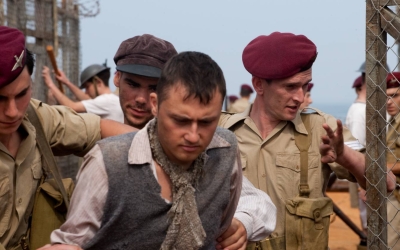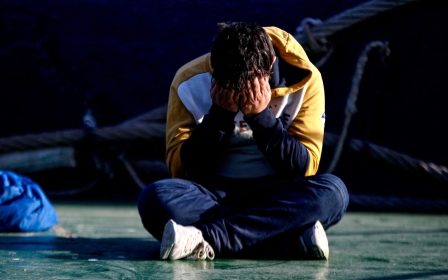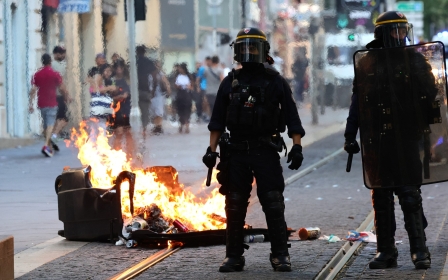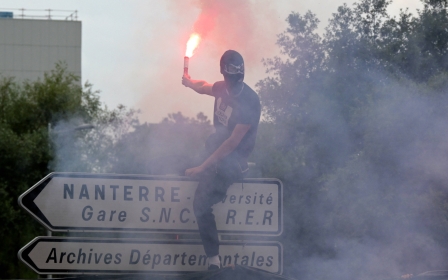The far-right plot to destroy a French film about police violence
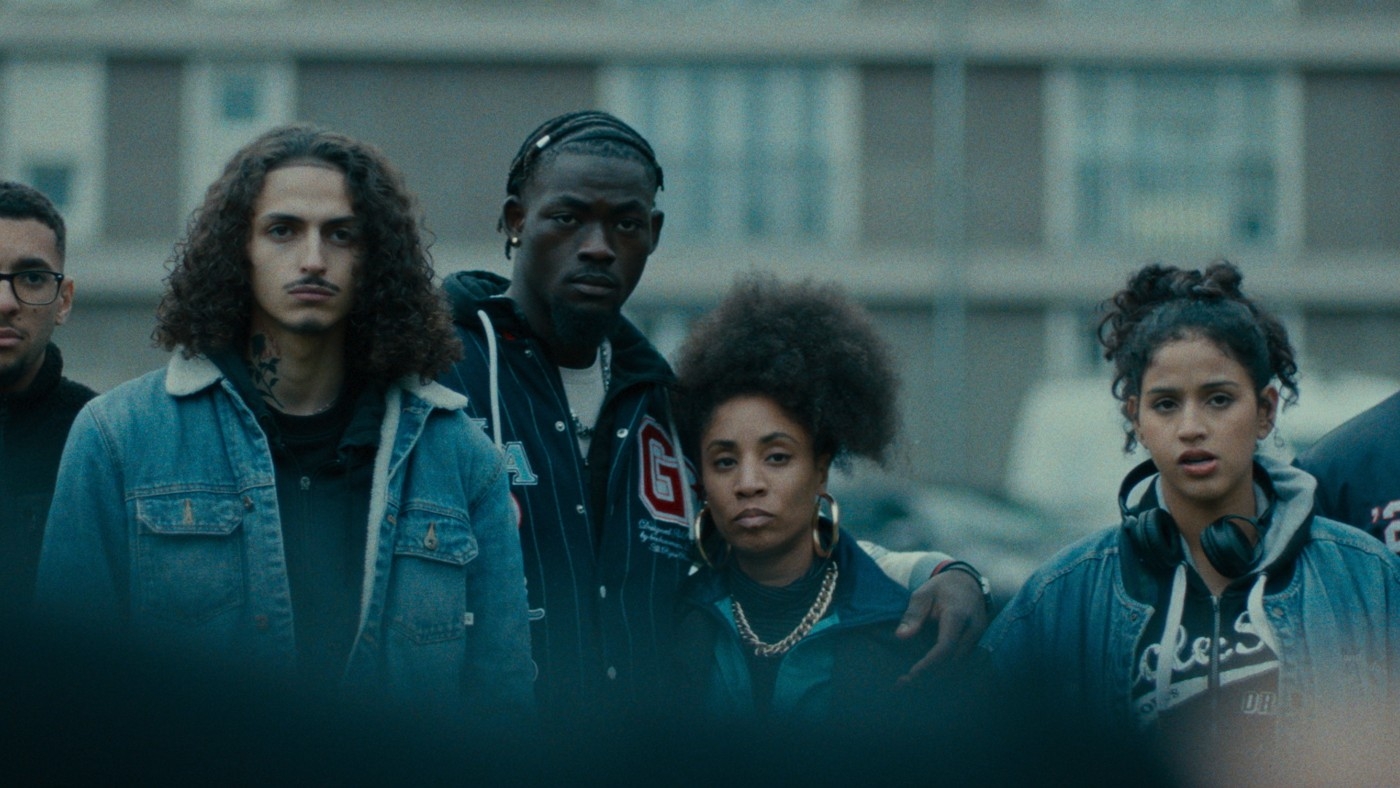
Even before Mehdi Fikri’s debut feature film was released in French cinemas in November, it was getting panned online.
AlloCine, France's equivalent of IMDB, was flooded with negative reviews for After the Fire (Avant que les flammes ne s’eteignent), which tells the story of a young woman searching for the truth about her little brother, who dies mysteriously in the custody of Strasbourg’s police.
“It was a political attack,” Fikri, 43, told Middle East Eye on a recent visit to London, where the film was playing as part of the last-ever Human Rights Watch film festival. “I think they saw the trailer and they realised we were doing a political movie on this subject.”
The user reviews for the film, which is available to stream in the UK this weekend, tear into its “racial agenda”, its “anti-cop” and “anti-France” messaging, its “hysteria” and “activist” tone.
Much of the vitriol is reserved for Camelia Jordana, a French singer of Algerian descent who plays the sister, whose search for the truth wakes her up to the political nature of the world she lives in.
New MEE newsletter: Jerusalem Dispatch
Sign up to get the latest insights and analysis on Israel-Palestine, alongside Turkey Unpacked and other MEE newsletters
Before she ever appeared in After the Fire, Jordana had incurred the wrath of the French far-right for critiquing the power of white men in society and for saying that she, like many others, does not feel safe when it comes to the police.
“Smear campaigns are as old as the far right,” Fikri said. “But online smear campaigns, with review bombing, are now a tool of it.”
He referenced the fourth series of True Detective, which was the victim of a “huge review bombing campaign on Rotten Tomatoes because it’s a show run by a Mexican woman (Issa Lopez) and it’s about Native American struggle in Alaska”.
Deaths in French police custody
A few months before After the Fire's November release, protests had erupted across France when Nahel Merzouk, a 17-year-old boy of Moroccan and Algerian descent, was shot at point-blank range by police in the Paris suburb of Nanterre. Just days after the incident, an online fundraiser for the police officer who killed Merzouk reached one million euros.
“It was a huge political fight, with the far-right raising money,” Fikri said. This, he believes, played a part in the attack on his film, though it also perfectly illustrated the point the first-time writer-director was trying to make in After the Fire.
“When you try and speak some truth, you will always have this kind of campaign. It’s hard to say the truth. That’s the main topic of the movie,” he told MEE.
“They are lying, and they are fighting for their lies. It’s about lies,” he said of the far-right in France.
'When you try and speak some truth, you will always have this kind of campaign. It’s hard to say the truth. That’s the main topic of the movie'
- Mehdi Fikri, French filmmaker
In September last year, Human Rights Watch reported that "ethnic profiling by French police has been extensively documented and condemned not just by national and international civil society groups, but also by international and national human rights bodies."
Fikri grew up the son of a Moroccan father and French mother in Saint-Denis, a commune in the northern suburbs of Paris well known for its multi-ethnic, working class population, and has been accused of trying to glamourise the family of Adama Traore, a 24-year-old Black Frenchman who died in police custody in 2016.
In September 2023, after a long campaign, an investigation into the death was officially closed, without any charges against the three police officers involved.
Fikri, a former journalist who spent 15 years working as a reporter for the leftist daily newspaper L’Humanite, drew from the case of Traore and four others: Lamine Dieng, who suffocated after Parisian police forced him down with a clamp grip; Ali Ziri, who fell into a coma and died in police custody; Wissam el-Yamni, a truck driver who was chased and then had a heart attack while being taken to a police station; and Amine Bentounsi, who was shot by police officer Damien Saboundjian, who was eventually given a suspended prison sentence.
The victims in these cases were all men from Black African or Arab backgrounds. Their families all fought long and hard to find out what had really happened to them and obtain some justice, which did not always come.
Fikri references the Haitian filmmaker Raoul Peck, who said that racism in France is about both “denial” and “paternalism”.
He compares France to Britain, which he sees as being defined by class. “London is so fucking violent,” Fikri said. “It’s a class-based society. But you would never have a Muslim mayor like Sadiq Khan in France. That is fucking science fiction.”
A child of communists
Because his parents were communists, and because Saint-Denis was run by communists, Fikri’s childhood was somewhat different, even though he always felt the social control of the police and was always ready to run whenever he encountered them.
“The political culture there is very strong,” he said of “the 9-3” (Neuf-trois, its official administrative number), which is what Saint-Denis’ residents call it.
For many people outside France, Mathieu Kassovitz's 1995 film La Haine defined les banlieues, the suburban housing projects where dreams of a better life came up against the violence and disdain of the French state and its police forces.
Fikri's memories of a 90s childhood in a place like this are defined by solidarity, but he says that things are now "much worse" than they were then. "It's very depressing."
Nevertheless, his communist parents’ commitment to another kind of world, to improving the lives of everyone around them, inspired Fikri and is at the heart of his film.
The journey the sister makes in trying to uncover the truth of what happened to her brother is one that takes her into the life of an activist.
“My parents were people trying to change the world with their ideology, and because they didn’t manage to do it, they used what they learnt politically to change their kids,” Fikri told MEE.
This meant that he got an education, empowered himself, was connected to his community and fought for it.
As a bi-racial Frenchman and as the son of communists, he “grew up in a post-racial world”, and it wasn’t until he started to work as a journalist that he truly saw how racially divided France is.
“I deeply love my parents because they showed me this world is possible,” Fikri told MEE. “Truth is revolutionary, and it is political to say the truth, to find the right words.”
This article is available in French on Middle East Eye French edition.
Middle East Eye delivers independent and unrivalled coverage and analysis of the Middle East, North Africa and beyond. To learn more about republishing this content and the associated fees, please fill out this form. More about MEE can be found here.


